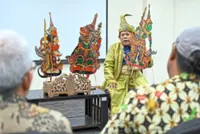Away from the buzz of South Africa's largest and wealthiest city, generations of Portuguese diners have gathered in one storied restaurant in search of a rare and simple pleasure - the taste of home.
It's unclear whether Portugal's President, Marcelo Rebelo de Sousa, in South Africa on Tuesday for his annual international trip marking Portuguese National Day, will visit the Johannesburg taberna, a mainstay of the local Lusophone community.





